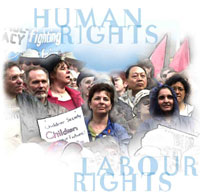This is an archive of news stories and research from the National Union of Public and General Employees. Please see our new site - https://nupge.ca - for the most current information.
Public Service Labour Relations Act (PSLRA), excludes student, casual, and short-term workers from access to collective bargaining
 Ottawa (6 Feb. 2009) – The Public Service Alliance of Canada (PSAC) is challenging the federal government’s definition of employee, claiming it denies certain federal public service workers the freedom of association guaranteed under section 2(d) of the Canadian Charter of Rights and Freedoms.
Ottawa (6 Feb. 2009) – The Public Service Alliance of Canada (PSAC) is challenging the federal government’s definition of employee, claiming it denies certain federal public service workers the freedom of association guaranteed under section 2(d) of the Canadian Charter of Rights and Freedoms.
The definition of employee in the Public Service Labour Relations Act (PSLRA) excludes student, casual, and short-term workers from access to collective bargaining under the Act. This provision prevents these workers from becoming union members and denies them access to the collective bargaining process contrary to the freedom of association guarantee in the Charter. PSAC, the largest federal public service union in Canada, has filed its case at the Ontario Superior Court of Justice.
“It is time for the Federal Government to accept that the Charter is for all members of Canadian society including federal public service workers,” says PSAC national president John Gordon. “For the Federal Government to deny any worker a fundamental freedom guaranteed by the Charter sends the message that the Federal Government believes the Charter can be ignored. We do not agree and we intend to fight for the right of these workers to become union members and to bargain collectively with their co-workers.”
The basis for PSAC’s court challenge is a June 2007 decision of the Supreme Court of Canada that ruled collective bargaining is a constitutional human right protected by the Charter of Rights and Freedoms. The ruling related to B.C.'s Health and Social Services Delivery Improvement Act (Bill 29) enacted by the Liberal government of Premier Gordon Campbell in 2002. The legislation cancelled collective agreement protections for health care workers in areas such as contracting out, and layoff and bumping rights.
The labour movement has already seen concrete benefits of the decision.
The Ontario Court of Appeal released its decision in November of last year against the Agricultural Employees Protection Act (AEPA) which denied Ontario farm workers the right to unionize and bargain collectively. The Court of Appeal ruled that the AEPA is unconstitutional because “it provides no statutory protections for collective bargaining.” The decision affects an estimated 32,000 agricultural workers in Ontario, including 16,500 migrant farm workers who come from Mexico and the Caribbean each year. It leaves Alberta as the only jurisdiction in Canada to deny agricultural workers collective bargaining rights
In December 2008, the government of Ontario proclaimed Bill 90, which amends the Colleges Collective Bargaining Act, giving over 17,000 part-time workers in Ontario’s community colleges their long quest for the right to unionize. These workers were excluded from bargaining under the legislation passed in 1972, and successive attempts have failed to overturn the law, until now.
As a result of this new legislation, college part-time workers are currently casting ballots in an Ontario Labour Relations Board vote to determine whether they wish to join the National Union’s Ontario component, the Ontario Public Service Employees Union (OPSEU/NUPGE).
Another breakthrough as a result of the historic June 2007 Supreme Court of Canada decision was an agreement reached in November 2007 by NUPGE’s Nova Scotia component, the Nova Scotia Government and General Employees Union (NSGEU/NUPGE) and its government to include approximately 2,000 casual employees who work in excess of 10 weeks in a 12-month period into existing NSGEU civil service bargaining units, thus granting them the right to join a union and bargain collectively. When the Civil Service Collective Bargaining Act was proclaimed in 1978, it restricted bargaining rights from a variety of groups, including those employed on a casual basis for less than 12 months or on a temporary or summer basis for less than six months.
Currently NUPGE’s New Brunswick component, the New Brunswick Union (NBU/NUPGE), is in discussions with its government to obtain bargaining rights for casual employees. These discussions are taking place at the same time that NBU and other public sector unions in the province have a Charter challenge before the courts against the discriminatory Public Service Staff Relations Act, which stipulates that casual public sector workers cannot join a trade union until they work for six consecutive months.
